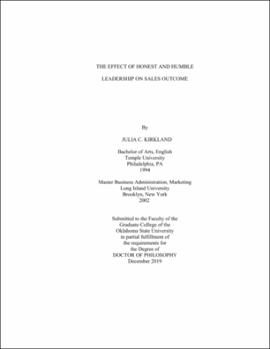| dc.contributor.advisor | Flaherty, Karen | |
| dc.contributor.author | Kirkland, Julia C. | |
| dc.date.accessioned | 2020-06-26T21:27:53Z | |
| dc.date.available | 2020-06-26T21:27:53Z | |
| dc.date.issued | 2019-12 | |
| dc.identifier.uri | https://hdl.handle.net/11244/324875 | |
| dc.description.abstract | The role of leaders in shaping team outcomes is vital (Williams et al., 2010). As such, we know leaders play a significant role, influencing the attitudes and behaviors of their employees. It is widely believed that by influencing the values and priorities of their followers, leaders inspire them to perform beyond expectations (Ou et al., 2015). The leader-follower relationship lies at the heart of all transformations that are initiated and triggered by leaders (Owens & Hekman, 2016). Based on the role theory and social exchange theory, LMX theory helps to explain the exchange relationship between leaders and subordinates in terms of antecedents and outcomes (Liden et al., 1997). The exchange relationship between leader and followers depends upon the value they can offer each other, and LMX provides a framework to evaluate the larger network of such exchanges, which then help explain important organizational outcomes such as performance and customer orientation (Liden et al., 1997). Therefore, LMX theory can be leveraged as a basis of examination in order to establish and present the outcomes of this study. Based on the literature, it appears that humility theory is a part of servant leadership, but it is not clear how both are related. There is no evidence to examine whether humility is a component or an antecedent of servant leadership (Rego et al., 2017). In a similar fashion, we don't know what impact servant leadership has on honesty-humility leadership. This study intends to fill this gap in the leadership literature by investigating the influence of servant leadership on honesty-humility leadership. Using Leader-Member Exchange (LMX) theory, this study will advance the literature by exploring the impact of servant leadership on honesty-humility theory of leadership and what influence their combined impact will have on organizational outcomes such as performance and customer orientation. | |
| dc.format | application/pdf | |
| dc.language | en_US | |
| dc.rights | Copyright is held by the author who has granted the Oklahoma State University Library the non-exclusive right to share this material in its institutional repository. Contact Digital Library Services at lib-dls@okstate.edu or 405-744-9161 for the permission policy on the use, reproduction or distribution of this material. | |
| dc.title | Effect of honest and humble leadership on sales outcome | |
| dc.contributor.committeeMember | Edwards, Bryan | |
| dc.contributor.committeeMember | Mason, Marlys | |
| dc.contributor.committeeMember | Wallace, Craig | |
| osu.filename | Kirkland_okstate_0664D_16554.pdf | |
| osu.accesstype | Open Access | |
| dc.type.genre | Dissertation | |
| dc.type.material | Text | |
| dc.subject.keywords | honesty | |
| dc.subject.keywords | humility | |
| dc.subject.keywords | relationship quality | |
| dc.subject.keywords | sales quota | |
| thesis.degree.discipline | Business Administration | |
| thesis.degree.grantor | Oklahoma State University | |
